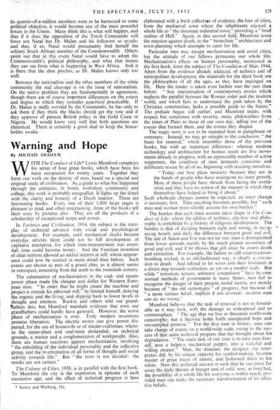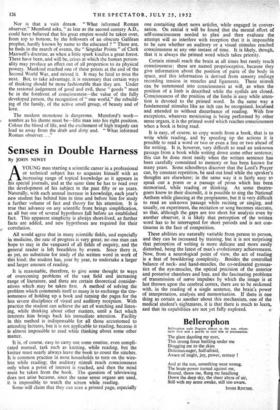Warning and Hope
By MICHAEL GRAHAM
WITH The Conduct of Life* Lewis Mumford completes his series of four great books, which have been his main occupation for twenty years. Together they form one work on the destiny of man, based on a special and original study of civilisation. As a guide to what has happened through the centuries, in home, workshop, community and college, this work is probably unequalled. It lights up the detail with the clarity and honesty of a Dutch interior. These are fascinating books. Every one of their 1,800 large pages is pleasant to read, and often entertaining: three of the books tell their story by pictures also. They are all the products of a scholarship of exceptional scope and power.
In Technics and CiiWiAation, 1934, the subject is the inter- play of technical advance with social and psychological development. For example, until mechanical clocks became everyday articles there could not he full development of capitalist enterprise, for which time-measurement was essen- tial; time could become money. And the Venetian invention of clear mirrors allowed an added interest in self, whose appear- ance could now be studied in more detail than before. Such events are shown as part of a grand plan, as it almost seems in retrospect, extending from the tenth to the twentieth century.
The culmination of mechanisation in the coal- and steam- power phase made life cheaper and duller for Western Euro- pean man. " In order that he might create the machine and project it outside his personal will," he limited himself, denying the organic and the living, and slipping back to lower levels in thought and emotion. Ruskin and others told our grand- tethers this; but Mumford marshals evidence that even our grandfathers could hardly have gainsaid. However, the worst phase of mechanisation is over. Truly modern inventions promise liberation. The electric motor can give power dis- persed, for the use of housewife or of master-craftsman, where- as the steam-plant and coal-mine demanded, on technical grounds, a master and a conglomeration of workpeople. Also, there are human reactions against mechanisation, involving " the rebuilding of the individual personality and the collective group, and the re-orientation of all forms of thought and social activity towards life." But " the issue is not decided: the results are not certain."
The Culture of Cities, 1938, is in parallel with the first book. To Mumford the city is the expression in epitome of each successive age; and the effect of technical progress is here
* Seeker and Warburg, 21s,
elaborated with a fresh collection of evidence, the lore of cities, from the mediaeval town where the inhabitants enjoyed a whole life to " the insensate industrial town," providing a " brief outline of Hell." Again, in this second field, Mumford notes the reaction against death, in the " biotechnic " architecture and town-planning which attempts to cater for life.
Particular men may escape mechanisation and avoid cities, but the attitude of our fellows permeates our whole life. Mechanisation's effects on human personality, mentioned in the first book, form the subject of The Condition of Man, 1944. Mart from the evidence already adduced, of technics and of metropolitan development, the materials for the third book are the philosophies of all the ages, as they have impinged on life. Here the reader is taken even farther into the past than before. " Any interpretation of contemporary events which neglects the parallel between the Roman order and the modern " world, and which fails to understand the path taken by the Christian communities, lacks a possible guide to the future." The prelude began still earlier, and Mumford treats, with respect but sometimes with severity, many philosophies from the times of Plato to those of our own day; telling too of the events that formed them, and the events they shaped.
The tragic story is not to be repeated here in paraphrase or summary. Instead, we may go straight to the conclusion, " the basis for renewal," which resembles those of the previous books, but with an important difference: whereas modern technology and architecture for human needs are live move- ments already in progress, with an appreciable number of active supporters, the condition of man demands conscious and deliberate rescue by all of us, beginning with rescuing ourselves.
" Today our best plans miscarry because they are in the hands of people who have undergone no inner growth. Most of these people have shrunk from facing the world- crisis and they have no notion of the manner in which they themselves have helped to bring it about."
Swift wholesale changes cannot be expected; an inner change is necessary first. Then anything becomes possible: but " each man and woman must silently assume his own burden."
The burden that each must assume takes shape in The Con- duct of Life, where the edifice of technics, city-lore and philo- sophy is completed by a history of religious development. Tho burden is that of deciding between right and wrong, in recog- nising hourly and daily the difference between good and evil. The tale of Adam and Eve was not far out; man is distinguished from lower animals mainly by his much greater awareness of good and evil, and if he- throws that gift away he courts death and extinction. For example, the failure to call extermination- bombing wicked, in an old-fashioned way. is clearly a conces- sion to death. And refusal to let wives join their husbands is a direct step towards extinction, as yet on a smaller scale. But while " terrorism, torture, arbitrary compulsion " have become normal methods of government in many States, men fail to recognise the danger of their present moral inertia, not merely -because of " the old stereotypes " of progress, but because of " a more sinister belief, implicit if not avowed : modern man can do no wrong."
Mumford believes that the task of renewal is not so formid- able as it may look, with the damage so widespread and so commonplace. " The age that we live in threatens world-wide catastrophe; but it likewise holds forth unexpected hope and unexampled promise." For the first time in history, man can take charge of events on a world-wide scale, owing to the suc- cess of that same technical progress that has brought about his degradation. " The main task of our time is to turn man him- self, now a helpless mechanical puppet, into a wakeful and willing creator." Man, the dreamer, the designer, the inter- preter, did, by his unique capacity for symbol-making, become master of great tracts of nature, and fashioned them to his whim. Now this technical success is such that he can press far away the daily threats of hunger and of cold; now, at long last, the possibility of a whole life for everyone is within reach, pro- vided man can make the necessary transformation of his effec- tive beliefs.
Nor is that a vain dream. " What informed Roman observer," Mumford asks, " as late as the second century A.D., could have believed that his great empire -would be taken over, from top to bottom, by the followers of an obscure Galilean prophet, hardly known by name to the educated ? " There are, be finds in the march of events, the " Singular Points " of Clerk Maxwell's doctrine, as when a little spark kindles a great forest. There have been, and will be, crises at which the human person- ality may produce an effect out of all proportion to its physical powers. Mankind reached one of these points at the end of the Second World War, and missed it. It may be fatal to miss the next. But, to take advantage, it is necessary that certain ways of thinking should be more fashionable than they are. Under the restored judgement of good and evil, these " goods " must be in the forefront of consciousness—the value of the fully developed person, the recognition of " one world," the rebuild- ing of the family, of the active small group, of beauty and of love.
The modern monotone is dangerous. Mumford's work- , sombre as his theme must be—lifts man into his right position. Colour the blood of life, and the excitement of high tragedy can lead us away from the drab and dirty end. " What informed Roman observer. . ."



































 Previous page
Previous page